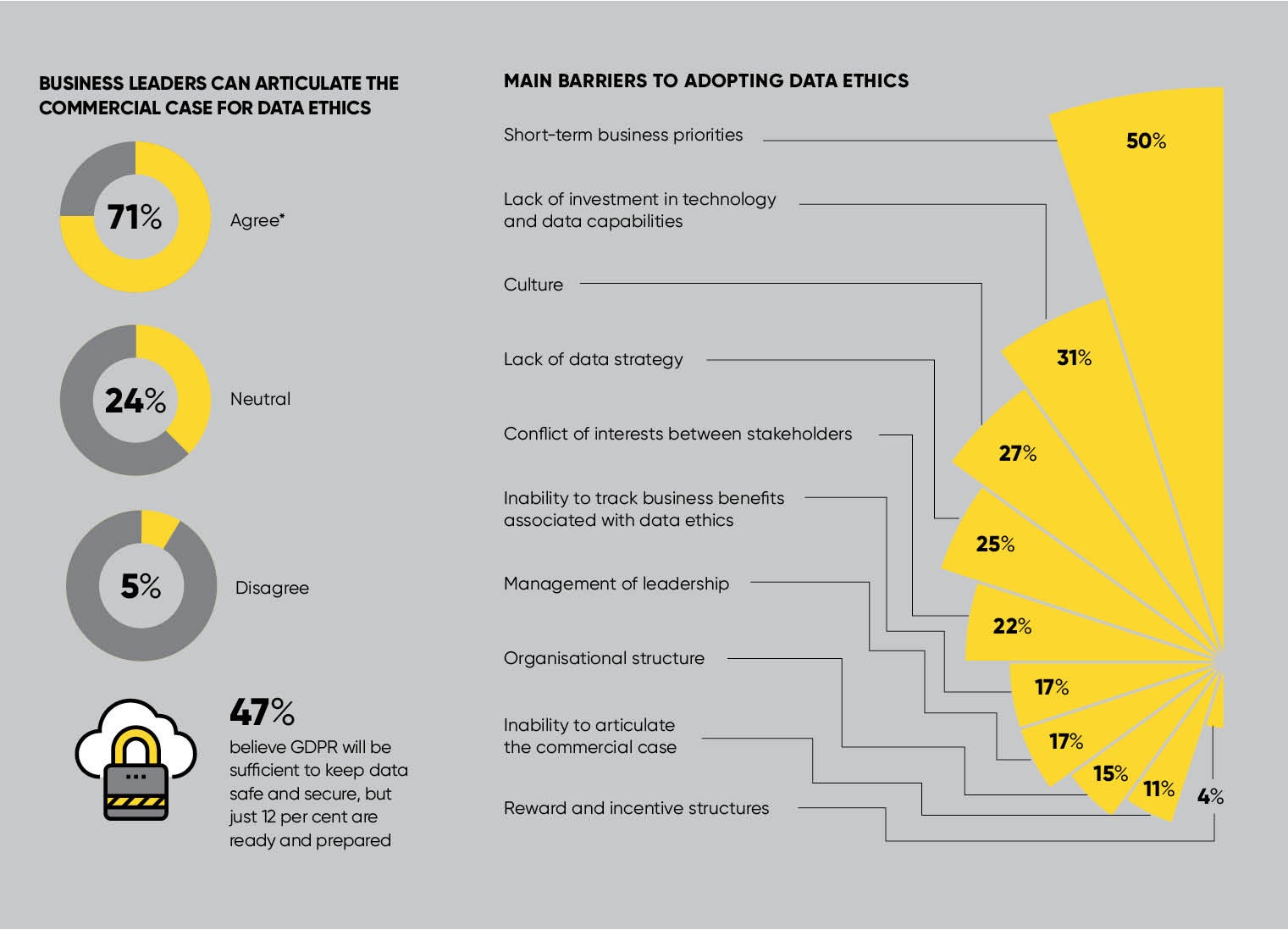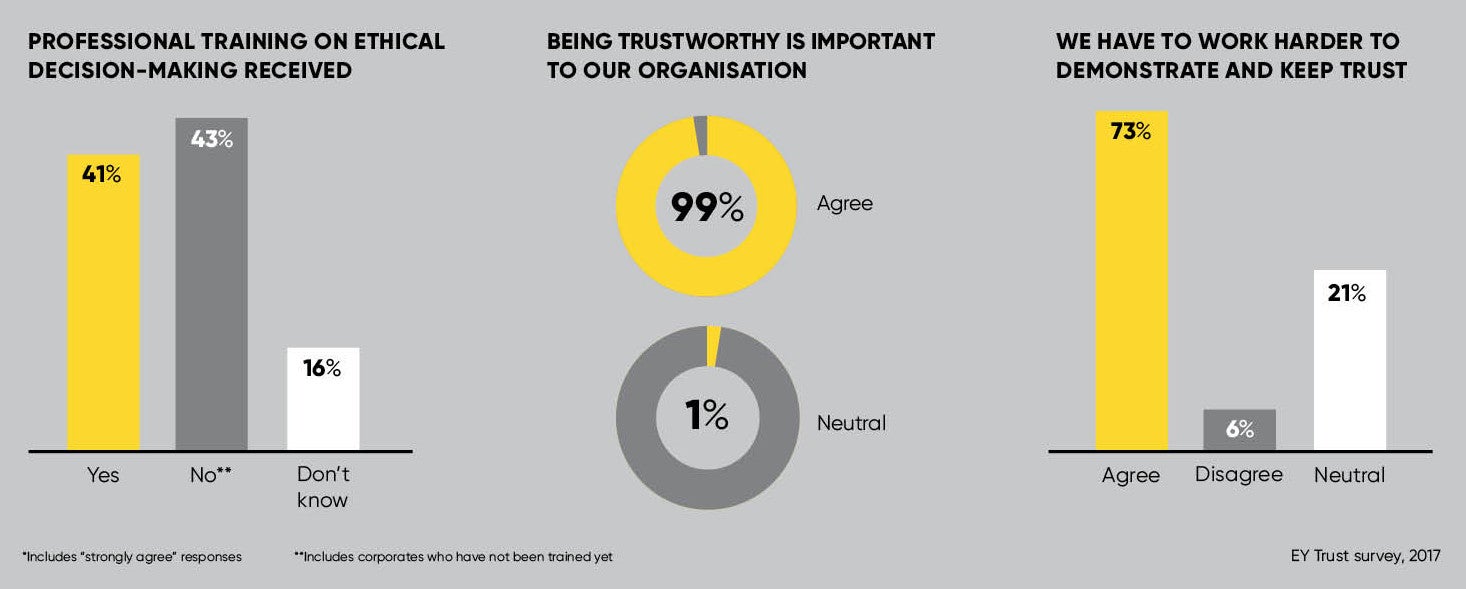 In the midst of an unsettled political climate defined by distrust in the establishment, public perceptions towards businesses have eroded. Consumers are increasingly dismissing traditional factors used to assess a company’s value, prioritising its ethics over the strength of its products, customer service or balance sheet.
In the midst of an unsettled political climate defined by distrust in the establishment, public perceptions towards businesses have eroded. Consumers are increasingly dismissing traditional factors used to assess a company’s value, prioritising its ethics over the strength of its products, customer service or balance sheet.
The current environment is leaving customers alienated and pessimistic, and companies are struggling to communicate their value.
The UK isn’t the only country suffering a diminishing relationship between the public and establishment. According to the 2017 Edelman Trust Barometer, trust in society’s core institutions – business, government, NGOs and media – is in crisis around the world. In a survey of 33,000 people in 28 countries, only 37 per cent consider these institutions credible spokespeople, an all-time low since the survey began in 2001. When quizzed on businesses specifically, only a third of people think chief executives are credible and two in three are more likely to believe leaked news over formal press releases.
Capitalism only works successfully when businesses deliver the moral duties society asks for in return for the financial rewards
With inflation continuing to outpace wage growth and sky-high prices in the house rental market further squeezing living costs, the majority of people feel they’re going to be worse off than their parents. Add to this the widespread view the public felt the impact of the last recession more than those responsible and the result is a growing feeling that economic models are failing. Capitalism only works successfully when businesses deliver the moral duties society asks for in return for the financial rewards.
“These are issues that manifest themselves into people thinking our current system of capitalism isn’t working for the majority,” says Hywel Ball, managing partner for assurance in the UK and Ireland at EY. “Then you get trends like social media, big data and the availability of news, which people feel companies haven’t responded to and don’t meet the expectations of transparency demanded from society at large.
“We’ve got this plummet in societal trust in the establishment of which business is a key part and it’s building. Companies need to realise they’re part of the problem. If they’re not part of the solution, society is going to demand the politicians do something about it, and we may get some knee-jerk regulation and possible unintended consequences.”
One regulation borne from the intermingling of data, ethics and trust in today’s society is the General Data Protection Regulation (GDPR), which replaces and unifies all existing data protection legislation across the European Union and aims to give citizens more control over how their personal data is used by companies.
The need for GDPR, which comes into force in May 2018, was flagged amid the worrying growth in data breaches. Just this year, cyberattacks have compromised or exposed data from a large number of organisations. But more regulation doesn’t necessarily equal more trust.
“It depends what it finds out because, if companies aren’t responding to GDPR, it might just raise the profile that actually companies aren’t looking after people’s data as well as they should be,” says Mr Ball. “In the first instance, it might not achieve what the politicians say it will. It’ll take a few years before that kicks into the system. But what it is doing is showing that more companies need to have a core capability around data management, not just for their commercial competitive advantage, but equally for their responsibility to society at large, and how they protect and look after that data.
“Most companies now in the knowledge economy are moving to being data managers in some shape of form. If people don’t comply with GDPR or underestimate the risks of not handling data in the correct way, I think we’ll just carry on having this series of what feel like mega cyber incidents where people are losing their data. As people become more aware of the personal value of their data and how organisations probably are exploiting them, the general awareness is going to increase the pressure on companies.”
To deal with this pressure, companies must equip staff with the expertise to make ethical decisions. In a recent survey by EY, 71 per cent of business leaders said they can articulate the commercial case for data ethics, but 50 per cent feel that short-term business priorities prevent them from adopting this approach and 43 per cent have no training on ethical decision-making. Some 99 per cent said being trustworthy is important to their organisation, but 73 per cent believe they have to work harder to demonstrate and keep that trust.
Doing so will require an end to the culture of short-term decision-making fuelled by the desire to please investors and shareholders with fiscal milestones. Businesses that survive and thrive in today’s environment of distrust will be those showing their value to local and global communities. Measures taken must not only be fully transparent, but also extend beyond corporate social responsibility box-ticking and encompass the long-term, sustainable value created by the company, resulting in a new-found trust between business and society.
“Companies need to get more interested in how they’re demonstrating and talking about the value they’re bringing to all their stakeholders,” says Mr Ball. “They must do that not just to ensure the investors or shareholders have a good understanding of how they’re trying to create long-term value to offset this short-termism pressure that’s in the current system, but also to communicate to society at large how they’re adding value to them. This can be fixed by more communication about true intent and transparency.”
Trust and ethics will become even more important as technology continues to remove some of the barriers to entry that previously existed in business. “If you look at us as a professional services company, we do three things: we know stuff, we act on behalf of people and society, and we behave ethically,” says Mr Ball. “The first two are going to be partly disrupted by the use of technology and analytics, so therefore our ethical behaviour becomes even more important because that is the bit people will be looking for.”
To learn more about the importance of trust in business please visit EY.com/longtermvalue


